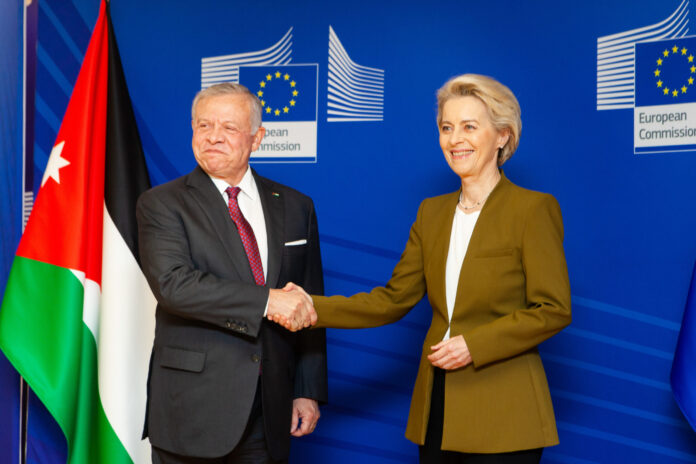The European Union has signed a Memorandum of Understanding with Jordan to deliver €500 million in macro-financial assistance; a move aimed at easing the country’s external financing pressures while supporting economic and political reforms.
The agreement, signed in Brussels by Commissioner Valdis Dombrovskis on behalf of the EU, marks the fourth package of its kind for Jordan. Approved by the European Parliament and the Council in April 2025, the funds will be disbursed over two and a half years, provided that Jordan meets the agreed reform milestones.
European Commission President Ursula von der Leyen described the deal as both a show of confidence in Jordan’s reform agenda and recognition of its role in a volatile region.
“Jordan is a strategic partner of the EU and we are investing €500 million in its future,” von der Leyen said, stressing that the package is designed to tackle immediate financing needs while advancing reforms in areas such as sustainable finance, green energy, governance, and anti-corruption.
The reforms tied to the programme cover public finance management, social protection, labour market policies, and business climate improvements. Progress on these commitments, alongside respect for political conditions, will determine the timing of disbursements. The first tranche is expected within a month, following a positive assessment by the European External Action Service and confirmation of Jordan’s continued engagement with the International Monetary Fund (IMF).
High Representative Kaja Kallas said the package reflects the EU’s recognition of Jordan’s regional importance. “From hosting large numbers of Syrian refugees to serving as a crucial channel for aid to Gaza, Jordan is an anchor of stability in the region and a close EU partner,” she said.
Other senior EU officials welcomed the deal, calling it a milestone under the EU-Jordan Strategic and Comprehensive Partnership adopted earlier this year. Commissioner Dubravka Šuica highlighted that together with a proposed fifth package currently awaiting approval, the EU’s macro-financial support to Jordan could reach €1 billion.
Jordan requested the assistance in October 2023, citing worsening economic strains from regional instability following the Israel-Gaza war. Since then, the IMF has approved both a four-year Extended Fund Facility, of which Jordan has already received USD 391 million, and a new USD 700 million arrangement under the Resilience and Sustainability Facility to address long-term challenges in water, energy, and public health.
Dombrovskis said the EU programme complements the IMF’s work, adding that it will “address Jordan’s balance of payments challenges and support economic stabilisation.”
The EU emphasized that the package is not only about financial relief but about strengthening Jordan’s resilience at a time of heightened regional pressures.

